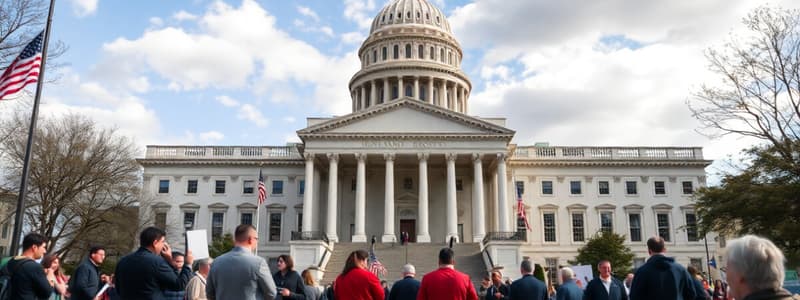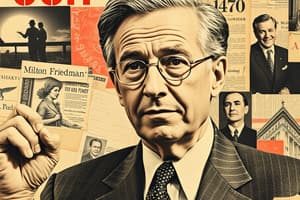Podcast
Questions and Answers
What is the primary purpose of Political Action Committees (PACs)?
What is the primary purpose of Political Action Committees (PACs)?
- To provide direct financial support to political parties only.
- To lobby for strict regulations on government spending.
- To develop educational programs for political engagement.
- To fundraise and spend to support or oppose candidates and legislation. (correct)
Which act established initial regulations on lobbying activities?
Which act established initial regulations on lobbying activities?
- Ethics in Government Act
- Honest Leadership and Open Government Act
- Federal Regulation of Lobbying Act (correct)
- Lobbying Disclosure Act
What stage of the policy-making process involves developing possible solutions?
What stage of the policy-making process involves developing possible solutions?
- Policy Adoption
- Policy Evaluation
- Policy Formulation (correct)
- Agenda Setting
Which of the following is a federal health insurance program for the elderly and disabled?
Which of the following is a federal health insurance program for the elderly and disabled?
What kind of policy is the No Child Left Behind Act related to?
What kind of policy is the No Child Left Behind Act related to?
What is the primary function of the Board of Governors?
What is the primary function of the Board of Governors?
Which of the following describes entitlement programs?
Which of the following describes entitlement programs?
What is the main goal of the Patient Protection and Affordable Care Act (ACA)?
What is the main goal of the Patient Protection and Affordable Care Act (ACA)?
What is the primary focus of the Monroe Doctrine?
What is the primary focus of the Monroe Doctrine?
Which of the following reflects the concept of Détente?
Which of the following reflects the concept of Détente?
The Truman Doctrine primarily aimed to provide support to which type of countries?
The Truman Doctrine primarily aimed to provide support to which type of countries?
What was a key component of the Marshall Plan?
What was a key component of the Marshall Plan?
Which policy encourages protecting domestic industries from foreign competition?
Which policy encourages protecting domestic industries from foreign competition?
Which doctrine emphasized support for anti-communist movements during the 1980s?
Which doctrine emphasized support for anti-communist movements during the 1980s?
What is the main goal of the Democratic Enlargement policy?
What is the main goal of the Democratic Enlargement policy?
Which of the following represents a contemporary challenge in US foreign policy?
Which of the following represents a contemporary challenge in US foreign policy?
What is the primary focus of muckraking in journalism?
What is the primary focus of muckraking in journalism?
What does the Equal Time Rule require of broadcast stations?
What does the Equal Time Rule require of broadcast stations?
Which of the following best describes narrowcasting?
Which of the following best describes narrowcasting?
What characterizes yellow journalism?
What characterizes yellow journalism?
What is the purpose of grassroots lobbying?
What is the purpose of grassroots lobbying?
Which of the following best defines 'off the record' information?
Which of the following best defines 'off the record' information?
What does disturbance theory explain about interest group formation?
What does disturbance theory explain about interest group formation?
What is the function of amicus curiae briefs?
What is the function of amicus curiae briefs?
Flashcards
Agenda Setting
Agenda Setting
The process of identifying issues that need to be addressed by policymakers.
Governmental (Institutional) Agenda
Governmental (Institutional) Agenda
A list of issues that are actively being considered by lawmakers.
Policy Formulation
Policy Formulation
The process of finding and crafting potential solutions to address identified problems.
Policy Adoption
Policy Adoption
Signup and view all the flashcards
Techniques of Policy Implementation
Techniques of Policy Implementation
Signup and view all the flashcards
Policy Evaluation
Policy Evaluation
Signup and view all the flashcards
Medicare
Medicare
Signup and view all the flashcards
Medicaid
Medicaid
Signup and view all the flashcards
Yellow Journalism
Yellow Journalism
Signup and view all the flashcards
Muckraking
Muckraking
Signup and view all the flashcards
Media Consolidation
Media Consolidation
Signup and view all the flashcards
Narrowcasting
Narrowcasting
Signup and view all the flashcards
Pluralist Theory
Pluralist Theory
Signup and view all the flashcards
Free Rider
Free Rider
Signup and view all the flashcards
Grassroots Lobbying
Grassroots Lobbying
Signup and view all the flashcards
Amicus Curiae Briefs
Amicus Curiae Briefs
Signup and view all the flashcards
Isolationism
Isolationism
Signup and view all the flashcards
Monroe Doctrine
Monroe Doctrine
Signup and view all the flashcards
Manifest Destiny
Manifest Destiny
Signup and view all the flashcards
Roosevelt Corollary
Roosevelt Corollary
Signup and view all the flashcards
Containment
Containment
Signup and view all the flashcards
Marshall Plan
Marshall Plan
Signup and view all the flashcards
NATO
NATO
Signup and view all the flashcards
Détente
Détente
Signup and view all the flashcards
Study Notes
Chapter 13: The News Media
- Penny Press: Affordable newspapers for a wider audience.
- Yellow Journalism: Sensationalist news with exaggeration.
- Muckraking: Investigative journalism uncovering societal issues.
- Radio, TV, Online News: Different news dissemination mediums.
- Corporate Ownership/Media Consolidation: Concentration of media ownership.
- Narrowcasting: Targeting media to specific audiences.
- On the Record: Information published with source identification.
- Off the Record: Information not to be published.
- On Background: Publication without direct source attribution.
- Deep Background: Information published without any attribution.
- Equal Time Rule: Broadcast stations must give equal airtime to candidates.
- Press Release: Official statements issued to media.
- Press Briefing: Meetings informing press without Q&A.
- Press Conference: Media events with Q&A opportunities.
- Covering Presidency, Congress, Supreme Court: Various reporting challenges.
- Media Effects, Agenda Setting, Framing: Media influence on public perception.
Chapter 14: Interest Groups
- Theories of Interest Group Formation:
- Pluralist Theory: Interest groups emerge naturally from shared concerns.
- Disturbance Theory: Groups form in response to societal changes.
- Transaction Theory: Groups form due to political transactions.
- Free Rider: Individuals benefiting without contributing.
- Patron: Financial supporter of an interest group.
- Grassroots Lobbying: Public mobilization to contact officials.
- Amicus Curiae Briefs: Legal briefs submitted to influence court decisions.
- Lobbying Congress, President, Judiciary: Strategies to influence government branches.
Chapter 15: Social and Economic Policy
- Stages of Policy Making Process:
- Agenda Setting: Identifying issues.
- Systematic Agenda: Broad issues under discussion.
- Governmental Agenda: Issues actively considered by policymakers.
- Policy Formulation: Developing potential solutions (routine, analogous, creative).
- Policy Adoption: Official approval of policies.
- Techniques of Policy Implementation: Authoritative, Incentive, Capacity, Hortatory.
- Policy Evaluation: Assessing policy effectiveness.
- Health Policy: Medicare, Medicaid, Patient Protection and Affordable Care Act (ACA), Public Health.
- Education Policy: No Child Left Behind Act.
- Fiscal Policy: Government decisions on taxation and spending.
- Monetary Policy: Federal Reserve, Reserve Requirements, Discount Rate, Open Market Operations.
- Income Security Policy: Government-provided benefits.
Chapter 16: Foreign and Defense Policy
- Historical Doctrines and Policies: Isolationism, Monroe Doctrine, Manifest Destiny, Roosevelt Corollary.
- World War I and II, League of Nations, United Nations: Major international conflicts and organizations.
- Cold War and Containment: Truman Doctrine, Marshall Plan, NATO, Détente, Reagan Doctrine, Democratic Enlargement.
- Foreign and Defense Policy Decision Making: Constitution, Executive, Congress, and Judiciary.
- Contemporary Challenges: Trade (Protectionism, Strategic Trade Policy), Terrorism, Nuclear Weapons.
- New Challenges: Russia, China, Europe, MENA.
- Non-means Tested Programs: Benefits based on no income criteria.
- Means Tested Programs: Benefits based on income criteria.
Studying That Suits You
Use AI to generate personalized quizzes and flashcards to suit your learning preferences.
Related Documents
Description
Test your knowledge on the fundamentals of Political Action Committees, major legislative acts, and policy-making processes. This quiz covers key concepts like the No Child Left Behind Act, entitlement programs, and crucial historical doctrines. Perfect for students studying political science or public policy.




